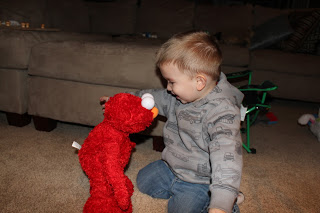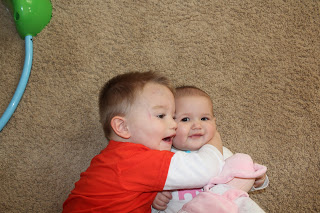 |
| Max, going in for a hug. |
With all of the hate in our world, I feel that raising children who are kind to one another is more important than ever. Instilling these qualities in your children is not a chore or a lecture. It is something you can do in your life every single day. The way you speak to your children, how you handle conflict, and your demeanor can shape your child into someone who is loving and kind. Here are some ways to raise a child that is confident, compassionate and happy:
Encourage kind behavior
Show your child how to treat things, and people, gently. If your child is rough, promote sweet behavior and physically lead by example. Show your child what it means to touch gently. This has been a big one in our house. Max was not yet two when Halle came home from the hospital. We used the world “gentle” more than any word. Even though she is nearly 8 months old (and not quite as fragile), Max still says “gentle” and gives her a kiss every night before going to bed.
Enforce rules and structure
There is more to raising compassionate children than being a compassionate parent. Children need limits, and they need structure. Some behavior, such as pinching or hitting, is never okay. Limits are necessary to help children realize that their behavior, good or not so good, affects others.
Expect the child to do his part
If your child makes a mess, sometimes it is easier and faster to clean it up yourself. However, this does not teach children about responsibility. Encourage children to clean up their messes. Make it fun. Helping them is okay. Just do not do it for them. Otherwise, you may have a teenager who feels like it is not his job to clean up after himself. A child should be responsible for his actions. We use the old faithful “Clean up, clean up” song and it works like a charm (for now).
Empower your child
Let them make decisions. Just do not let them have control. For instance, give them two or three choices instead of saying “What do you want to eat for dinner?” Try, “We can have cheese pizza, turkey burgers, or chicken nuggets for dinner.” (This does get harder as you have more children and everyone wants something different).
Direct friendship
Explain that being kind to one another is the rule. Do not allow name-calling. Put a label on kind actions, such as when you see your child sharing. You can say things like, “What a good friend/brother/sister you are, sharing that toy.” The positive reinforcement of kind behavior will teach your child that compassionate behavior is positive and valued by others. I make sure to praise the heck out of Max when he brings his little sister a toy he knows she likes.
 |
| Max loving on his baby sister. |
Promote helpful behavior
Kids like to feel like they are helping, so explain how charities work at their level. If your child earns a small allowance, let him put aside some of it to donate to a local church or food bank. If Halle spits up and we clean it up, shortly after we look over to see Max “cleaning” the carpet. Max sees me giving Halle baby food and guess what? He “feeds” his Elmo. He is already learning empathy at the age of two.
Assign chores at home
This enables your child to feel like he is helping, so make the chore something small like feeding a pet or even taking his plate to the sink (when old enough). A calendar with a schedule on the refrigerator can help your child keep track of what his or her chores are, and it lets your child see how everyone in the family pitches in to help one another. Take advantage of online resources to help figure out what chores are appropriate for your child’s age.
Use books
Reading books with your child is a good habit in more ways than one. A great way to show your child that all children are not the same is through reading a story. Find books that show children of different colors, who wear different clothes and live in different places, and are unique but all alike at the same time. Let your child know that being different is okay, and that accepting one another for our differences is important.
The power of affection
I never say no to a hug. I show a lot of affection to my kids by way of kisses, including the “Eskimo” version where we rub noses. We also give hugs, pats, and touches. Studies have shown that people who receive a high level of affection as babies and children have lower levels of anxiety as adults. Take the time to nurture your children when they are young. Create a steady flow of positivity, and in turn, you can help your children better cope through their childhood years, and into adulthood.
Remember that the temperament your child was born with does play a role in his or her actions. Some of us are born with an innate love for others, while some of us are not as attuned to people’s feelings. It is likely, as a parent, you are already doing a lot of the things it takes to raise a loving, happy child who turns into a compassionate and caring adult.
Let’s connect on social media too:
Mumbling Mommy on Facebook
Mumbling Mommy on Twitter
Mumbling Mommy on Pinterest
Tags: affection








